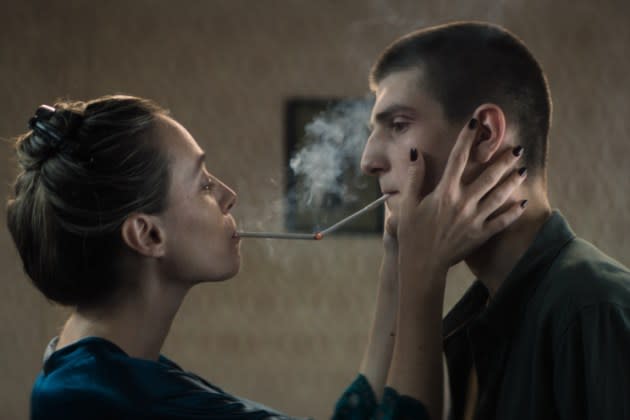‘Panopticon’ Review: A Starkly Relevant Story of Warped Masculinity in Georgia

To begin with, Georgian writer-director George Sikharulidze’s debut feature places us mercilessly right into the last place on earth most of us would ever want to find ourselves: the lanky, concave frame and warped, self-loathing mindset of an incipient incel.
Eighteen-year-old Sandro (remarkable newcomer Data Chachua) is a creep: a surreptitious groper in public places, a gawky loner at the football club where he trains, and a sulky checked-out student in his final year of high school. But Sikharulidze’s clever screenplay soon deepens and complicates his characterization, making him quietly emblematic of the masculinity crisis being navigated by Georgia’s younger generation, in which modern, progressive values do battle with sexism, right-wing ideology and a strain of ancient religious hypocrisy that leaches like a toxin into the bloodstream of the body social. “Panopticon” may not have quite the all-seeing eye its title implies, but its gaze is piercing and sharp and strange.
More from Variety
'Xoftex' Review: Noaz Deshe Returns With a Bold, Feverish Vision of Refugee Camp Survival
Michel Franco's 'Dreams,' Starring Jessica Chastain, to Be Sold by the Match Factory (EXCLUSIVE)
Karlovy Vary Proxima Competition Entry 'Chlorophyll' Unveils Trailer (EXCLUSIVE)
At home, Sandro lives under a different all-seeing eye: that of the icon of Jesus that adorns the wall shrine in the apartment he shares with his disapproving, atheist maternal grandmother and his insufferably pious, frequently absent father (Malkhaz Abuladze). Dad clearly regards his own relationship with God as far more important than anything as banal as his earthly relationship with Sandro, and with the boy’s mother away in the U.S. and unable to return until her papers come through, there is little to check Sandro’s worst impulses from running rampant and hormonal through an already troubled psyche.
When he finds a USB stick that one of his teammates, Lasha (Vakho Kedeladze), has lost at football practice and discovers it contains both porn and a seemingly innocent clip of Lasha’s hairdresser mother Natalia (Ia Sukhitashvili) celebrating her son’s birthday, no prizes for guessing which video gets him Oedipally hot enough to turn the Jesus picture to the wall and masturbate. He starts to low-level stalk Natalia at her salon — seldom has the comforting sensuality of getting one’s hair shampooed been better evoked. His fixation is then made easier to pursue but also more fraught when Lasha, who is dabbling in a little light hate-crime thuggery, unexpectedly befriends Sandro and he begins hanging out at Natalia’s apartment.
Somewhat surprisingly, Sandro does have a girlfriend, Tina (Salome Gelenidze) — a peripheral character who could have done with a little more development given her narrative importance later on. But Sandro’s deep-buried sense of sexual shame and his archaic notions about the purity of women, mean that despite his general horniness he is the one offended when she floats the possibility of sex before marriage. Instead, he draws closer to Natalia who, as portrayed by Sukhitashvili (so riveting in Dea Kulumbegashvili’s “Beginning”), responds with sly, part-maternal, part-romantic ambivalence.
As we’ve come to expect from new Georgian cinema, the controlled aesthetics match the thematics, with the story’s moral murkiness reflected in a palette rich in drear and damp. Backdropped by mottled walls and faded wallpapers, Ketevan Nadibaidze’s muted production design makes the most of both domestic spaces and coldly impersonal institutional interiors: locker rooms, classrooms, the dingy monastery to which Sandro’s father absconds after he decides to become a monk. The atmosphere of confinement is further enhanced by a recurrent motif of doubling — between Sandro and Lasha after Sandro gets his floppy hair trimmed down to a buzzcut, between Tina and her best friend Lana (Marita Meskhoradze) and between strangers on the subway who suddenly, mysteriously are revealed to be twins.
Such flourishes have an air of repressed surreality, as thought they’re the pressure-valve manifestations of a stricken subconscious trying to relieve some of its pent-up misery. But otherwise, “Panopticon” remains largely in a register of only-marginally-heightened realism that is unusual in new Georgian cinema. Even though in the casting of Sukhitashvili it nods to the more formally severe “Beginning,” and even though it features a snippet of Alexander Koberidze’s “What Do We See When We Look at the Sky?,” Sikharulidze’s film in fact splits the difference between those titles’ overtly allegorical nature and the restraint and unadorned focus of the Romanian New Wave.
Perhaps that is unsurprising given that it’s a Romanian co-production and the DP is Oleg Mutu, best known for shooting Cristian Mungiu’s Palme-winning “4 Months, 3 Weeks, 2 Days.” But although we can track such influences on “Panopticon,” it is also its own chimeric animal, an impression reinforced by this serious, hard-hearted film’s surprisingly moving finale, which dispenses a slender measure of redemptive hope that is all the more miraculous for surviving a culture in which the personal is political, and the political is all-pervasive.
Best of Variety
Sign up for Variety’s Newsletter. For the latest news, follow us on Facebook, Twitter, and Instagram.

